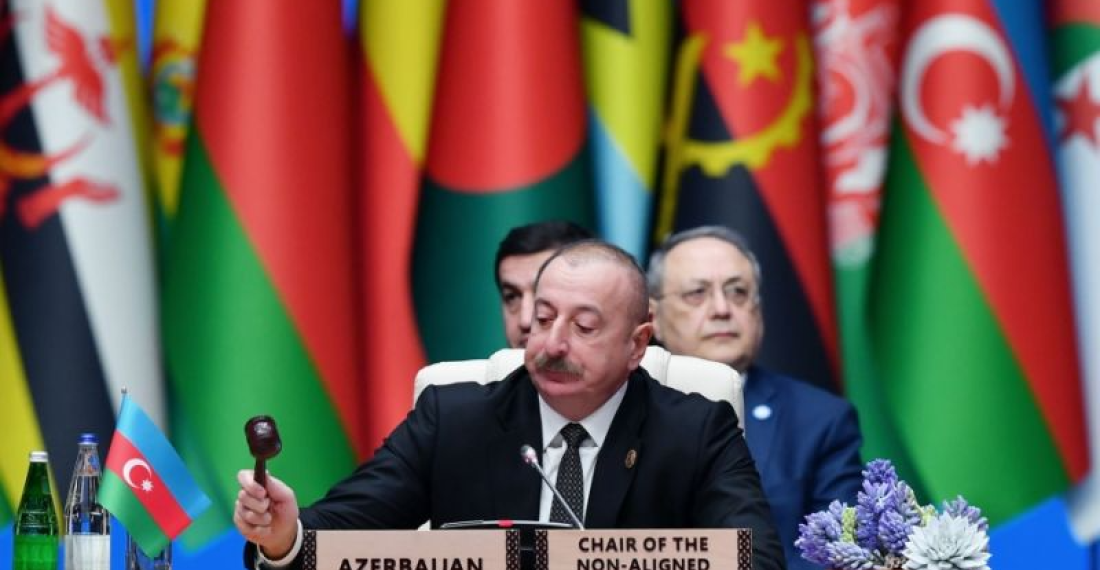"Azerbaijani chairmanship over the Non-Aligned Movement has been a critical success for the country’s foreign policy as well as brought about significant development for the institutionalization and reinvigoration of the Movement," writes Vasif Huseynov in this op-ed for commonspace.eu. "Azerbaijan is now poised to hand over its chairing role to Uganda at the 19th Summit of the Heads of State and Government of the Non-Aligned Movement to be held on 15-20 January 2024."
On 6-7 July, Baku hosted the Ministerial Meeting of the Non-Aligned Movement (NAM), an institution of 120 member states across four continents. It was the last major event of the NAM organized under the chairmanship of the Republic of Azerbaijan, after the summit this March on post-pandemic recovery in Baku, where issues related with global governance and post-pandemic recovery were discussed.
Azerbaijan, a full member of the NAM since 2011, took over the chairing role at the 18th summit of the movement, which took place on 25-26 October 2019 in Baku. Last year, the Azerbaijani chairmanship was extended for another year by unanimous decision from NAM members.
Baku lead various initiatives for the institutionalization of the Non-Aligned Movement
President Ilham Aliyev of Azerbaijan in his inaugural address to the ministerial meeting on 6 July recalled the major developments that took place under the Azerbaijani chairmanship over the past four years. As he noted, this period was replete with many regional and global challenges through which the NAM navigated skillfully and came up with a more consolidated power and structure.
The Non-Aligned Movement responded with a united voice to the Covid-19 pandemic whose start coincided with the first year of the Azerbaijani chairmanship. The NAM Online Summit initiated by Azerbaijan at the leaders’ level in May 2020, the strong opposition the movement showed to “vaccine nationalism” pursued by some wealthy countries, and subsequent UN resolutions for equitable and universal access to vaccines for all countries testified to NAM’s leadership in combating coronavirus.
Over the past four years, Azerbaijan also succeeded in pushing for the institutional development of the NAM. The establishment of the NAM Parliamentary Network and NAM Youth Organization in 2021 and 2022 respectively constituted major steps in that direction. In a very important move, Baku has also proposed the establishment of the NAM women’s platform and began work towards this end. Praising these achievements, President Aliyev proudly stated that “with these steps towards institutional sustainability [of the NAM], we will definitely leave a successful legacy to incoming chairs”.
The Non-Aligned Movement supported Azerbaijan in its conflict with Armenia
Azerbaijani chairmanship at the Non-Aligned Movement (NAM) proved to be advantageous for Azerbaijani diplomacy during the period of heightened tensions in the Armenia-Azerbaijan conflict in 2020. During the Karabakh war in October 2020 as well as in 2022, NAM members blocked an anti-Azerbaijan statement at the UN Security Council.
In a significant success for Azerbaijan during the 2020 war, NAM member states thwarted an attempt by France and Russia to adopt a draft UN statement that did not contain references to four well-known UN Security Council resolutions on the occupation of Azerbaijani territories. As a result of the persistence of the Non-Aligned Movement, the draft statement was withdrawn.
It is therefore not surprising that Azerbaijan has joined in calls for reforms to the UN Security Council (UNSC) and characterized the body as being “reminiscent of the past” which “does not reflect the modern reality”. In particular, Azerbaijan calls for the allocation of one permanent seat to the Non-Aligned Movement and one seat for the African continent at the UNSC. According to President Aliyev, the “countries holding the position of chair of the NAM, Organization of Islamic Cooperation and African Union should have their seats at the UN Security Council on a rotating basis with a veto right”.
France was criticized in Baku for neocolonialism and biased support for Armenia
Baku also used the ministerial meeting to raise its voice against colonialism and islamophobia across the world. France turned out to be a major country widely criticized by Azerbaijan and many other member states of the NAM for neo-colonial policies vis-à-vis Comoros, New Caledonia and other Paris-administered overseas communities and territories. A side event was organized on the “Complete elimination of colonialism” at the initiative of the Center of the Analysis of International Relations (AIR Center), where a declaration was adopted calling for the establishment of the Baku Initiative Group against French colonialism.
Azerbaijan does not conceal its outrage at the policies of the French President Emmanuel Macron towards the Armenia-Azerbaijan peace process. A few days before the NAM’s ministerial meeting, Armenian media quoted President Macron who, in a meeting with the Armenian community in Marseille, as having said, “I have put and will continue to put more pressure on Aliyev than [Armenian Prime Minister Nikol] Pashinyan himself. The question is for Pashinyan. I am the only one who has a clear position and message on the Artsakh [Karabakh] issue”.
This statement and overall biased policies of the French government vis-à-vis the Armenia-Azerbaijan peace process has outraged the Azerbaijani government and raised questions about the true intentions and objectives of President Macron.
That said, Azerbaijani chairmanship over the Non-Aligned Movement has been a critical success for the country’s foreign policy as well as brought about significant development for the institutionalization and reinvigoration of the Movement. Azerbaijan is now poised to hand over its chairing role to Uganda at the 19th Summit of the Heads of State and Government of the Non-Aligned Movement to be held on 15-20 January 2024.
source: Dr Vasif Huseynov, is a Senior Advisor at the Center of Analysis of International Relations (AIR Center) and Adjunct Lecturer at Khazar University in Baku, Azerbaijan.
photo: Antara News
The views expressed in opinion pieces and commentaries do not necessarily reflect the position of commonspace.eu or its partners







